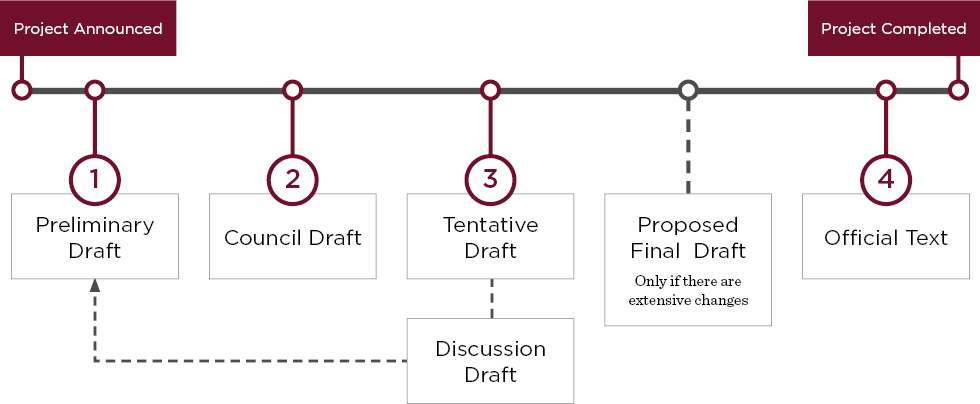Project Life Cycle
Project Life Cycle
The nature, content, and scope of each project are initially developed by one or more Reporters in consultation with the Institute's Director. The Director's recommendations that particular projects be undertaken and designations of specific Reporters are subject to the approval of the Council or Executive Committee.
A project is developed in a series of drafts prepared by the Reporters and reviewed by the project's Advisers and Members Consultative Group, the Council, and the ALI membership. Preliminary Drafts and Council Drafts are available only to project participants and to the Council. Tentative Drafts, Discussion Drafts, and Proposed Final Drafts are made available to the public after the Annual Meeting. Once it is approved by the membership at an Annual Meeting, a Tentative Draft represents the most current statement of the Institute’s position on the subject and may be cited in opinions or briefs in accordance with Bluebook rule 12.9.4, e.g., Restatement (Second) of Torts §847A (Am. L. Inst., Tentative Draft No. 17, 1974), until the official text is published. The vote of approval allows for possible further revision of the drafts to reflect the discussion at the Annual Meeting and to make editorial improvements.
Drafting Cycle

The project's Reporters initially prepare a Preliminary Draft of one or more substantial segments of the project for review by the Advisers. Preliminary Drafts also are reviewed by the Members Consultative Group for the project.*
When the Director determines that the subject matter of a Preliminary Draft is ready for consideration by the Council, the Reporters prepare a Council Draft, which incorporates revisions made in light of the previous review by the Advisers and Members Consultative Group. Upon completion of its review, the Council may decide that all or part of the draft should be revised. The draft then returns to the Reporters for revisions. In the alternative, Council may conclude that all or part of the draft, subject to revisions, should be submitted to the ALI membership at the next Annual Meeting.
A Tentative Draft, incorporating any revisions from Council, is prepared for the Annual Meeting. It is distributed in advance to the entire membership, which is invited to submit written comments and suggestions. The draft is then presented to the membership at the Annual Meeting, where it is open for comments and suggestions. At the close of discussion, the Tentative Draft, subject to any changes resulting from the Annual Meeting discussion, is put to a vote and may be approved by the membership in whole or part. Any part that is not approved returns to the Reporters for further revision and eventual resubmission to the membership.
In some instances, the Council may conclude that a draft is not ready for action by the membership, but nevertheless would benefit from discussion among members at the Annual Meeting. In such cases, the Council directs that the draft, as revised following the Council Meeting, be submitted to the membership for discussion only. Such a draft, called a Discussion Draft, is distributed and presented to membership for comments and suggestions, but is not put to a vote.
The drafting cycle continues in this manner until each segment of the project has been approved by both the Council and the membership. When extensive changes are required, the Reporters may be asked to prepare a Proposed Final Draft of the entire work, or appropriate portions thereof, for review by the Council and membership. Review of this draft is not de novo, and ordinarily is limited to consideration of whether changes previously decided upon have been accurately and adequately carried out. Upon final approval of the project, the Reporters, subject to oversight by the Director, prepare the Institute's official text for publication.
Project Participants
A project's Advisers are designated by the Institute's Director, in consultation with the Reporters and subject to approval of the Council or Executive Committee. They are selected for their particular knowledge and experience of the subject or the special perspective they are able to provide. They constitute an intellectually and geographically diverse group of practitioners, judges, and scholars and normally include one or more members of the Council.
Members Consultative Groups consist of Institute members who have a special interest in the project's subject. Each group meets no more than annually to review a Preliminary Draft. Members may join a group at any time.